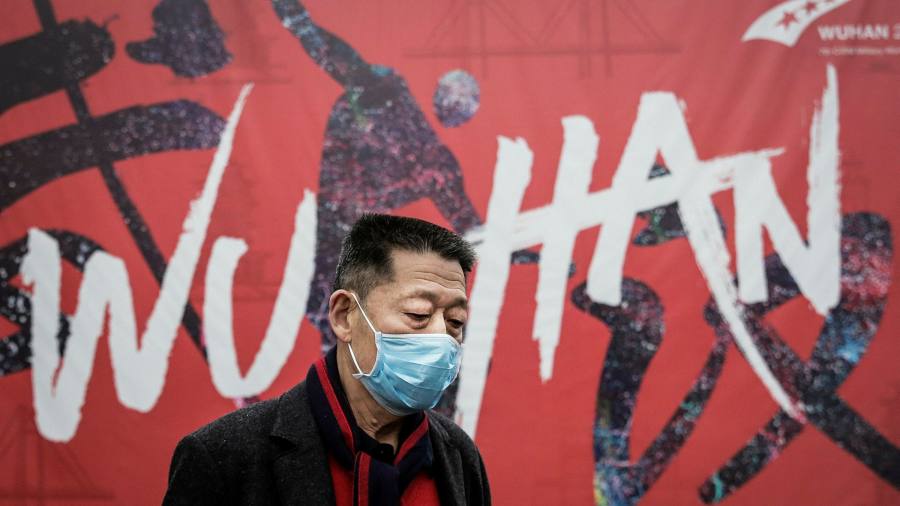[ad_1]
World Health Organization investigators have downplayed a Chinese theory that coronavirus was brought to Wuhan through frozen food, underlining the charged geopolitics surrounding the roots of Covid-19.
Vladimir Dedkov from the Institute Pasteur in St Petersburg, Russia and Fabian Leendertz, an emerging diseases specialist at Germany’s Robert Koch Institute, both told the Financial Times that it was extremely unlikely the first cases of Sars-Cov-2 identified in Wuhan in 2019 entered the city on frozen or refrigerated goods.
Both men were part of the WHO team that travelled to Wuhan in January to investigate the origins of the pandemic. But in the press conference that concluded the visit last month, the WHO did not rule out the theory, which has been pushed hard by China’s government and state media.
“We know that the virus can persist and survive in conditions that are found in these cold and frozen environments, but we don’t really understand if the virus can then transmit to humans,†Peter Ben Embarek, the head of the investigation, said at the time.
Back on home ground in Russia, however, Dedkov was more definitive. He said that samples of frozen food from Huanan market in Wuhan, which had tested positive for Sars-Cov-2, were probably contaminated by humans rather than the other way round.
“It’s very difficult to imagine a situation where all this [contaminated] food came to one market in China, and not the biggest one at that, from different countries and it all started from there,†Dedkov said. “We aren’t taking it out of consideration but we think it’s very unlikely given the facts we know today.â€
Leendertz in Germany told the FT in a separate interview that although the transmission of Covid-19 via frozen foods was theoretically possible, the role of cold-chain transport was not the most important question.Â
“If you transport a virus fresh or frozen, the virus is not born from a piece of plastic. It’s about where the virus is from before that. Cold chain is never the source,†he said.
Embarek also told the journal Science that frozen food “was not a possible route of introduction. There were no widespread outbreaks of Covid-19 in food factories around the worldâ€.
The WHO briefing in February left unclear the mission’s findings on a series of important and politically charged questions about the virus’ origins. The resulting confusion from the press conference, during which Embarek also said it was “extremely unlikely†that the virus leaked from a lab, provoked international criticism.
Jake Sullivan, US national security adviser, said the White House had “deep concerns†about the way the findings were communicated and how the mission was conducted. Tedros Adhanom Ghebreyesus, WHO director-general, later clarified that “all hypotheses remain open and require further analysis and studiesâ€.
Chinese scientists and state media outlets remain strong proponents of the frozen food theory, both as a way of explaining the original Wuhan infections and smaller outbreaks across the country, and in an attempt to protect China’s reputation.
At the same time, Chinese authorities have intensified efforts to screen imported cold chain goods for fear that food or its packaging could seed outbreaks.Â
The WHO and most western governments have remained sceptical of the science behind China’s claims. The US food and agriculture organisation, for example, said that contamination of foods and packaging had been an “extremely rare eventâ€.
In December, Chinese scientists in the eastern port city of Qingdao published a paper detailing how they had isolated Sars-Cov-2 on the outer packaging of imported frozen cod.
In the same month, a second Chinese paper analysed an outbreak in Beijing centred around the Xinfadi wholesale market. The study found that many infected individuals were from a section of the market selling imported salmon, where six out of 3,582 samples of the fish tested positive for Sars-Cov-2.
“We speculate that the Covid-19 resurgence in Beijing was likely to be initiated by an environment-to-human transmission originated from contaminated imported food via cold-chain logistics,†the authors concluded.
The WHO is expected to publish a full report of its Wuhan findings this month. Team members have said that immediate research should focus on the leading theory that the virus jumped from one animal, likely a bat, to a second intermediary host before spilling over to humans.
The international health body has also warned that attempts to influence or politicise virus origins research, such as pre-emptive efforts to rule out particular geographic regions, threatened to undermine the science.Â
Leendertz, the German emerging diseases specialist, said the investigation should not be “influenced by US press pushing it into China†or attempts to point fingers at China.
Other than knowing that the closest known relatives of the virus were found in horseshoes bats in south-west China and Cambodia, he said, “we have no idea about the geographic origin at the momentâ€.
Additional reporting by Guy Chazan in Berlin
Coronavirus business update

How is coronavirus taking its toll on markets, business, and our everyday lives and workplaces? Stay briefed with our coronavirus newsletter.
[ad_2]
Source link







